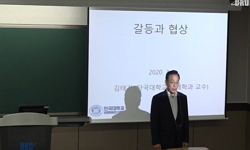이 연구는 우리나라 협상자들이 가지는 인구학적 특성과 문화 가치가 비윤리적 협상 전략에 대한 평가와 사용의도에 미치는 영향을 연구한 것이다. 협상자의 문화 가치에 따라 전통적 경쟁...
http://chineseinput.net/에서 pinyin(병음)방식으로 중국어를 변환할 수 있습니다.
변환된 중국어를 복사하여 사용하시면 됩니다.
- 中文 을 입력하시려면 zhongwen을 입력하시고 space를누르시면됩니다.
- 北京 을 입력하시려면 beijing을 입력하시고 space를 누르시면 됩니다.
https://www.riss.kr/link?id=A77053665
- 저자
- 발행기관
- 학술지명
- 권호사항
-
발행연도
2009
-
작성언어
Korean
-
주제어
협상 ; 윤리 ; 체면 ; 홉스테드(Hofstede) 문화 변수 ; 에믹(emic) ; 에틱(etic) ; negotiation ; ethic ; Chemyon ; face ; Hofstede’s cultural dimensions
-
등재정보
KCI등재
-
자료형태
학술저널
- 발행기관 URL
-
수록면
212-244(33쪽)
- 제공처
-
0
상세조회 -
0
다운로드
부가정보
국문 초록 (Abstract)
연구결과, 인구학적 특성과 문화 가치는 모두 비윤리적 협상 전략에 대한 평가에 영향을 주고 있었다. 인구학적 특성의 경우, 연령과 경력은 유의미한 결과를 나타냈으나 성별과 협상 스타일은 유의미한 영향을 미치지 않았다. 문화 변수의 경우, 체면 변수의 설명력이 홉스테드의 문화변수보다 높게 나타나는 경향을 보여, 비윤리적 협상 전략에 대한 우리나라 협상자들의 인식과 태도에 체면이 중요한 영향을 미치고 있다는 것을 확인할 수 있었다. 연구 결과를 바탕으로 문화 현상에 대한 에믹(emic) 접근과 에틱(etic) 접근의 유용성에 대해 논의하였다.
이 연구는 우리나라 협상자들이 가지는 인구학적 특성과 문화 가치가 비윤리적 협상 전략에 대한 평가와 사용의도에 미치는 영향을 연구한 것이다. 협상자의 문화 가치에 따라 전통적 경쟁협상, 상대 네트워크 공격, 거짓약속, 허위정보 전달 및 비윤리적 정보 수집의 다섯가지 비윤리적 전략에 대한 평가와 사용의도에 차이가 나타나는지 살펴보았다. 특히 협상자의 문화 가치를 측정함에 있어 보편적(etic) 문화 가치로 인정되는 홉스테드(Hofstede) 문화변수와 우리나라 고유의 문화 변수인 ‘체면’을 함께 고려하여 문화 변수들 간의 상대적 설명력을 비교하였다.
연구결과, 인구학적 특성과 문화 가치는 모두 비윤리적 협상 전략에 대한 평가에 영향을 주고 있었다. 인구학적 특성의 경우, 연령과 경력은 유의미한 결과를 나타냈으나 성별과 협상 스타일은 유의미한 영향을 미치지 않았다. 문화 변수의 경우, 체면 변수의 설명력이 홉스테드의 문화변수보다 높게 나타나는 경향을 보여, 비윤리적 협상 전략에 대한 우리나라 협상자들의 인식과 태도에 체면이 중요한 영향을 미치고 있다는 것을 확인할 수 있었다. 연구 결과를 바탕으로 문화 현상에 대한 에믹(emic) 접근과 에틱(etic) 접근의 유용성에 대해 논의하였다.
다국어 초록 (Multilingual Abstract)
Survey result shows age and gender had significant effects only for traditional competitive bargaining, but gender and personal negotiation style did not have any effects for the inappropriate strategies. Hofstede’s dimensions as well as Chemyon dimensions had significant effect for perceived inappropriateness and likelihood of using inappropriate strategies. While both Chemyon and Hofstede’s dimensions were significant, Chemyon accounted for more variance than Hofstede dimensions in most cases. This suggests Chemyon’s vital role in explaining Korean negotiators’ perception and attitude towards inappropriate negotiation strategies. Implications of the results and future research are discussed.
This study examined the effects of cultural factors and demographic factors on the perceived appropriateness and likelihood of using five categories of inappropriate negotiation strategies. Five categories of inappropriate negotiation strategies consi...
This study examined the effects of cultural factors and demographic factors on the perceived appropriateness and likelihood of using five categories of inappropriate negotiation strategies. Five categories of inappropriate negotiation strategies consist of traditional competitive bargaining, attacking opponent’s network, false promises, misrepresentation of information and inappropriate information gathering. Two kinds of cultural variables, Hofstede’s cultural dimensions and ‘Chemyon’ dimensions were used as universal, etic variables versus indigenous, emic variables.
Survey result shows age and gender had significant effects only for traditional competitive bargaining, but gender and personal negotiation style did not have any effects for the inappropriate strategies. Hofstede’s dimensions as well as Chemyon dimensions had significant effect for perceived inappropriateness and likelihood of using inappropriate strategies. While both Chemyon and Hofstede’s dimensions were significant, Chemyon accounted for more variance than Hofstede dimensions in most cases. This suggests Chemyon’s vital role in explaining Korean negotiators’ perception and attitude towards inappropriate negotiation strategies. Implications of the results and future research are discussed.
목차 (Table of Contents)
- 1. 연구배경
- 2. 문헌연구
- 3. 연구문제
- 4. 방법론
- 5. 연구결과
- 1. 연구배경
- 2. 문헌연구
- 3. 연구문제
- 4. 방법론
- 5. 연구결과
- 6. 결론 및 논의
- 참고문헌
- ABSTRACT
동일학술지(권/호) 다른 논문
-
- 한국언론정보학회
- 이원(Won Lee)
- 2009
- KCI등재
-
IPTV 수용자의 이용행태와 서비스 만족도에 대한 연구
- 한국언론정보학회
- 설진아(Jin-Ah Seol)
- 2009
- KCI등재
-
- 한국언론정보학회
- 이상우(Sang-Woo Lee)
- 2009
- KCI등재
-
통신 및 미디어 산업에서의 카르텔에 대한 심결사례 연구
- 한국언론정보학회
- 오정호(Jeong-Ho Oh)
- 2009
- KCI등재





 ScienceON
ScienceON DBpia
DBpia






